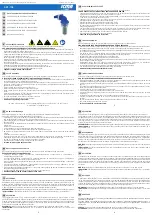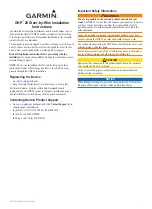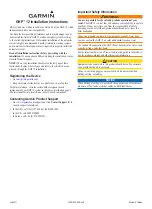
4.3 SeaTalk
ng®
power supply
Power is supplied to the product over the
SeaTalk
ng
backbone.
A
SeaTalk
ng
backbone requires one 12 V dc power
supply, connected to the
SeaTalk
ng
backbone. This
can be provided by:
• a battery
(1)
, via the distribution panel,
• an Autopilot Control Unit (
ACU
)
(2)
,
• an
SPX
course computer
(2)
,
• for 24 V vessels a 5 amp, regulated, continuous
24 V dc to 12 V dc converter is required.
Note:
• (1) The battery used for starting the vessel’s
engine(s) should NOT be used to power the
SeaTalk
ng
backbone as this can cause sudden
voltage drops, when the engines are started.
• (2) The
ACU-100
and
SPX-5
cannot be used to
power the
SeaTalk
ng
backbone.
SeaTalk
ng®
power connection point
Small systems
If the backbone length is 60 m (197 ft) or less, the
power connection point may be connected at any
point in the backbone.
Large systems
If the backbone length is greater than 60 m (197 ft),
the power connection point should be connected at
a point that creates a balanced current draw from
each side of the backbone. The Load Equivalency
Number (LEN) is used to determine the power
connection point for the system.
D13424-1
LEN = 3
LEN = 3
LEN = 1
LEN = 1
LEN = 1
LEN = 1
12 V dc
In the example above the system has an overall LEN
of 10, so the optimum connection point would be to
have 5 LEN either side of the connection point.
In-line fuse and thermal breaker ratings
The
SeaTalk
ng®
network’s power supply requires an
in-line fuse or thermal breaker to be fitted.
In-line fuse rating
Thermal breaker rating
5 A
3 A (if only connecting one
device)
Note:
• The suitable fuse rating for the thermal breaker
is dependent on the number of devices you are
connecting. If in doubt consult an authorized
Raymarine dealer.
SeaTalk
ng®
system loading
The maximum loading / LEN for a
SeaTalk
ng
system
depends on the length of the backbone.
Loading type
Backbone length
Total LEN
Unbalanced
20 m (66 ft)
40
Unbalanced
40 m (131 ft)
20
Unbalanced
60 m (197 ft)
14
Balanced
60 m (197 ft) or
less
100
Balanced
80 m (262 ft)
84
Balanced
100 m (328 ft)
60
Balanced
120 m (394 ft)
50
Balanced
140 m to 160 m
(459 ft to 525 ft)
40
Balanced
180 m to 200 m
(591 ft to 656 ft)
32
Power distribution — SeaTalk
ng®
Recommendations and best practice.
• Only use approved
SeaTalk
ng®
power cables. Do
NOT use a power cable designed for, or supplied
with, a different product.
• See below for more information on implementation
for some common power distribution scenarios.
Important:
When planning and wiring, take into
consideration other products in your system, some
of which (e.g. sonar modules) may place large
power demand peaks on the vessel’s electrical
system.
Note:
The information provided below is for
guidance only, to help protect your product. It
covers common vessel power arrangements, but
does NOT cover every scenario. If you are unsure
how to provide the correct level of protection,
please consult an authorized Raymarine dealer or
a suitably qualified professional marine electrician.
Implementation — direct connection to battery
•
SeaTalk
ng®
power cables may be connected
directly to the vessel's battery, via a suitably rated
fuse or breaker.
Cables and connections
23
Summary of Contents for P70
Page 2: ......
Page 4: ......
Page 10: ...10 p70 p70R ...
Page 14: ...14 p70 p70R ...
Page 28: ...28 p70 p70R ...
Page 29: ...Chapter 5 Installation Chapter contents 5 1 Mounting on page 30 Installation 29 ...
Page 38: ...38 p70 p70R ...
Page 48: ...48 p70 p70R ...
Page 58: ...58 p70 p70R ...
Page 68: ...68 p70 p70R ...
Page 74: ...74 p70 p70R ...
Page 80: ...80 p70 p70R ...
Page 94: ...94 p70 p70R ...
Page 110: ...110 p70 p70R ...
Page 118: ...118 p70 p70R ...
Page 121: ......
















































